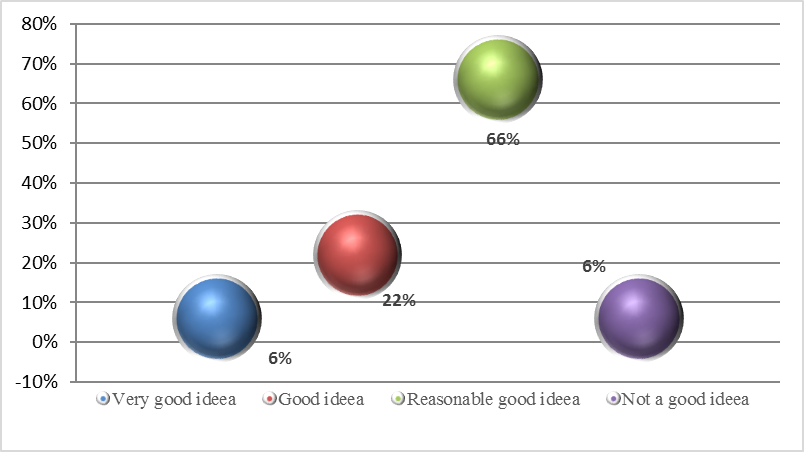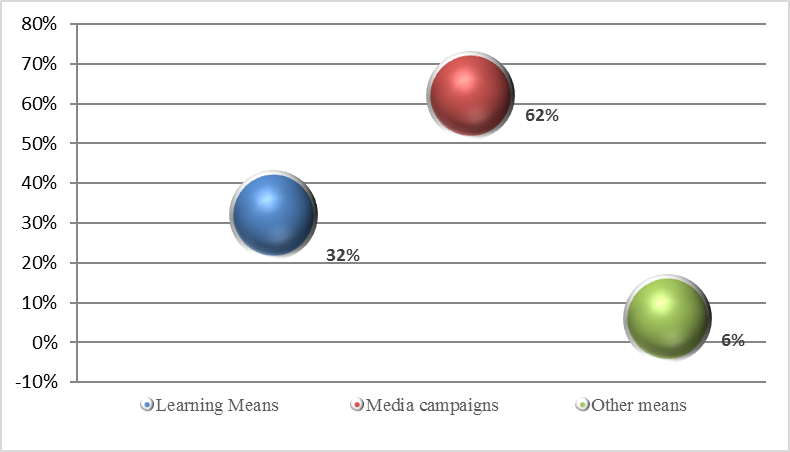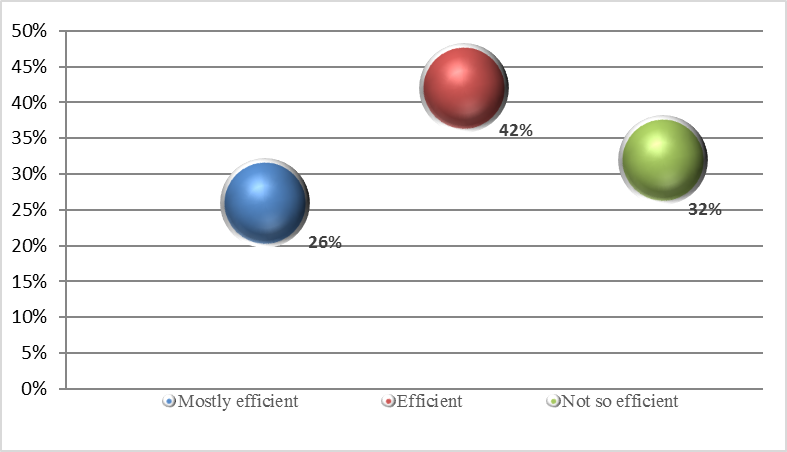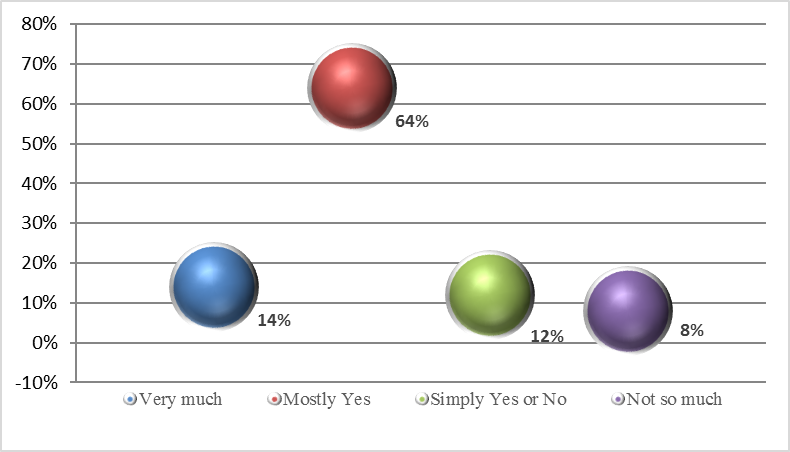Abstract
In the last period, it was noticed a clear trend in the scientific research, which is oriented on the promotion of responsible research and innovation. Thus, we have identified a growing concern in many countries for: conducting research and innovation based on ethical principles, facilitating the public / open access to results of the research, developing connections between research, education and society etc. As such, the public commitment assumed by those research and innovation activities implies researchers who are concerned to promote their work and results to facilitate the understanding and internalizing of the produced results by the societal actors. In this respect, the paper intends to analyse the public perceptions regarding the ways of its engaging in responsible research and innovation activities. For reaching this purpose, it was designed a questionnaire with ten items, which was administered to a part of the participants in a major event - the
Keywords: Public engagementresponsible research and innovationresearch activitiesEuropean Researcher’s NightIRRESISTIBLE Project
Introduction
According to the
At the same time, in various European Union bodies, it is foreshadowed the idea that research should be based both on academic integrity and proper social reaction. As such, the researchers’ intellectual freedom and the social responsibility represent the core values of scientific research, which must be respected and promoted consistently. Those two values should be mutually supportive, in the scientific research and educational systems, with regard of formal, non-formal and informal educational settings, trying to underline specific contexts of contemporary society.
The researchers, whether they are coming from universities or research institutes, from the economic environment or industry, have to assume moral responsibility for the research and especially for its results. Research and innovation should be responsible in relation to society, the environment and humans. As such, a solid connection should be made at the level of social practices, between the principles of responsible research and innovation: engagement, gender equality, science education, accessibility, ethics, governance and sustainability.
Problem Statement
The
- contributes to
- infuse differing
- grants to fostering more societally
Public engagement implies a
Research Questions
Taking into account the importance that public engagement has for a transparency research and innovation process in the actual society, it is normal to raise questions that target to a number of specific
what are the proper ways to involve the public in research activities?
what are the suitable methods to enhance the attractiveness of scientific research to the general public?
what are the effectiveness of current methods in order to raise the public engagement in research activities?
Purpose of the Study
Having in mind the above-mentioned questions, it is important to see and evaluate the public perception regarding the ways of its engaging in responsible research and innovation activities.
Taking into account that public engagement in research and innovation activities is expressed especially in the foreknowledgement of Horizon 2020 programme - a European programme dedicated mainly to researchers -, not so many citizens are familiarized with the concept and its specificity. In this respect, it can be said that this study represents a real starting point on understanding the dimensions of responsible research and innovation by general public.
Research Methods
For reaching the purpose, it was designed a questionnaire with ten items, which was administered to a part of the participants in a major event - the
Findings
When they were questioned about how they perceive the idea of involving the public in research activities, the respondents stated a rate of 6% that is a

Regarding the methods by which we can engage citizens in research activities, 33% of them said it has connections with the learning / teaching methods, 62% believe that the most effective are the media campaigns, and the remaining 6% give importance to other methods such as: scientific conferences, workshops, exhibitions, visits to research institutions etc. Practically, the basic idea that emerges from here, given the tremendous difference between the first two answers, is that education should intensify their efforts and step up their actions to promote the involvement of the general public (students, teachers, school managers, parents, other societal actors) in research activities.

Regarding the extent that current methods of public engagement are effective, 26% of respondents believe that they are



Conclusion
The obtained results allow us to affirm that we are witnessing
In this context, the promotion of the public engagement in relation to responsible research and innovation activities will substantially increase the public involvement in research activities and become a current social practice, absolutely necessary for the progress of humanity, science, technology and society as a whole.
Acknowledgments
All formal / informal / non-formal activities were developed with the support of the project: “IRRESISTIBLE - Including Responsible Research and Innovation in Cutting Edge Science and Inquiry-based Science Education to Improve Teacher's Ability of Bridging Learning Environments” - a coordination and support action under FP7-SCIENCE-IN-SOCIETY-2013-1, ACTIVITY 5.2.2 “Young people and science” - Topic SiS.2013.2.2.1-1: Raising youth awareness to Responsible Research and Innovation through Inquiry Based Science Education. This project has received funding from the European Union’s Seventh Framework Programme for research, technological development and demonstration, under grant agreement no 612367. The support offered by the European Commission, through the project mentioned above, is gratefully acknowledged.
The authors thank to all the teachers and students who participated in the activities organized in the project (including those organized in non-formal settings, in the frame of the IRRESISTBLE Project, mostly during the National week: “School in Another Way: To know more, to be better!
References
- Anghel, G. A., Gorghiu, G. & Măntescu, G. (2016). Valorization of RRI Dimensions in Non-Formal Education. A Case Study Related on a Thematic Exhibition in Museum. The European Proceedings of Social & Behavioural Sciences, 7, 21-25.
- European Charter for Researchers and a Code of Conduct for the Recruitment of Researchers. (2005). Retrieved from https://euraxess.ec.europa.eu/jobs/charter/european-charter
- European Commission (2005). Recomandarea Comisiei din 11 martie 2005, cu privire la Carta Europeană a cercetătorului şi un cod de conduită pentru recrutarea cercetătorilor (Text care prezintă interes pentru Ţările Comunităţii Europene) (2005/251/CE)
- European Commission (2016). The EU Framework Programme for Research and Innovation. HORIZON 2020. Retrieved from: http://ec.europa.eu/research/participants/data/ref/h2020/call_ptef/pt/2016-2017/h2020-call-pt-msca-rise-2016-17_en.pdf
- Petrescu, A. M. A., Gorghiu, G. & Gorghiu, L. M. (2016). The Role of Non-formal Activities on Familiarizing the Students with Cutting-Edge Science Topics. The European Proceedings of Social & Behavioural Sciences, 18, 458-463.
Copyright information

This work is licensed under a Creative Commons Attribution-NonCommercial-NoDerivatives 4.0 International License.
About this article
Publication Date
30 July 2017
Article Doi
eBook ISBN
978-1-80296-026-6
Publisher
Future Academy
Volume
27
Print ISBN (optional)
-
Edition Number
1st Edition
Pages
1-893
Subjects
Teacher training, teaching, teaching skills, teaching techniques,moral purpose of education, social purpose of education, counselling psychology
Cite this article as:
Petrescu, A. M. A., Gorghiu, G., & Olteanu, R. L. (2017). Ways Of Valorizing The Public Engagement In Responsible Research And Innovation. In A. Sandu, T. Ciulei, & A. Frunza (Eds.), Multidimensional Education and Professional Development: Ethical Values, vol 27. European Proceedings of Social and Behavioural Sciences (pp. 617-622). Future Academy. https://doi.org/10.15405/epsbs.2017.07.03.72

